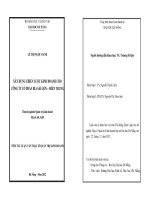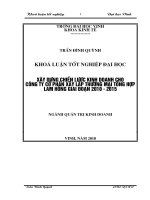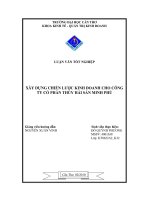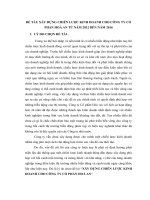Xây dựng chiến lược kinh doanh cho công ty cổ phần x20 giai đoạn 2013 2018
Bạn đang xem bản rút gọn của tài liệu. Xem và tải ngay bản đầy đủ của tài liệu tại đây (314.41 KB, 7 trang )
Business strategy for Gatexco 20
period 2013 – 2018
Nguyễn Đình Duy
Đại học Quốc gia Hà Nội
Ngành: Quản trị kinh doanh; Mã số: 60 34 05
Người hướng dẫn: TS. Nguyễn Thị Phi Nga
Năm bảo vệ: 2012
Abstract: The strategies of the company show the future of the company on doing its
businesses. They analyze the industry segment of which the company is operating;
determine the target market and customers segment for medium and long term; and the
competitive advantages must build up and maintain. The development of business
strategies, however, is a complex task that requires a lot of attentions from BOD and the
company‟s resources. The research begins with a brief introduction on business strategy
management definition and the process of strategic planning. To develop a strategic
planning complied with sustainability, the company needs to apply fundamental analysis
or namely tool box of strategic planning such as industry segment analysis, value chain
analysis, generic business strategies, and network success factors and resources analysis.
To make all theories above to be practical, the author will use the case of GATEXCO20
and assess the current business strategy of the company. The assessment bases on the
results achieved during the interview with managers of GATEXCO20. Then, I will
conduct some conclusions and recommendation. The author has been working in
GATEXCO20 for more than six years and it is an interesting field that the author loves to
work for. With significant knowledge and experience after the years working as well as
the author‟s role in company, the author does believe that this research would also be a
valuable fundament for the author‟s career development in the years coming.
Keywords: Quản trị kinh doanh; Chiến lược kinh doanh
vi
TABLE OF CONTENTS
ACKNOWLEDGEMENT i
ABSTRACT ii
TÓM TẮT iv
TABLE OF CONTENTS vi
LIST OF FIGURES ix
LIST OF TABLE x
INTRODUCTION 1
A. Background and Rational 1
B. Objectives 2
C. Scope and Limitation 3
CHAPTER 1: FOUNDATION THEORY FOR STRATEGIC
MANAGEMENT 4
1.1. The definition of business strategy 4
1.2. The definition of business strategic planning 4
1.3. The business strategic planning process 5
1.4. Tools used in business strategic planning 8
1.4.1. SWOT matrix 8
1.4.2. Porter‟s Five Forces Model 9
1.4.3. PEST analysis 11
vii
1.4.4. Value chain analysis 13
CHAPTER 2: EXTERNAL AND INTERNAL ANALYSIS 16
2.1. EXTERNAL ANALYSIS 16
2.1.1. PEST Analysis 16
2.1.2. Industry analysis 32
2.1.3. Summary external analysis 38
2.2. INTERNAL ANALYSIS 41
2.2.1. Primary activities 44
2.2.2. Support activities 55
2.2.3. Summary internal analysis 60
CHAPTER 3: SELECTED STRATEGIES FOR GATEXCO 20 AND
INPLEMENTATION PLAN 64
3.1. Choosing functional strategies 64
3.1.1. SWOT analysis 64
3.1.2. GREAT analysis 74
3.2. Performing components of strategy implementation 76
3.2.1. Strategy 77
3.2.2. Systems and structure 77
3.2.3. Style 77
3.2.4. Staff 78
3.2.5. Skills 80
3.3. Action Plans 82
3.3.1. Activities functional strategy 1 - Product quality management 82
viii
3.3.2. Activities functional strategy 2 – Build-up the raw material system 87
3.3.3. Activities functional strategy 3 – Product diversification 88
3.3.4. Action plans for five years strategies 91
3.4. Recommendations to GATEXCO20 for strategies implementation 95
3.5. Recommendations to the Government 97
CONCLUSIONS 98
REFERENCES 100
100
REFERENCES
1. Ahire, S. L. 1997. Management Science- Total Quality Management
interfaces: An integrative framework. Interfaces 27 (6) 91-105
2. Business online dictionary, Strategy definition. Retrieved online at
3. Colquitt, Joetta, (2007). Credit Risk Management: How to Avoid
Lending Disasters & Maximize Earnings. 3rd Edition. McGraw-Hill.
USA;
4. Eximbank Annual Report 2010. Retrieved online at
5. Eximbank internal report in 2010 and 2011;
6. Eximbank Prospectus. Retrieved online at
7. National Institute of Open Schooling. Function of commercial banks.
pp 21-32. Retrieved online at />33.pdf;
8. Isobel Doole, Robin Lowe, (2008). International marketing strategy:
Analysis, Development and Implementation, 5th Edition, Cengage
Learning EMEA, pp7-17;
9. Porter, M.E. (1980), Competitive Strategy, Free Press, New York;
10. Thenmozhi, M. (2001), Strategy Formulation: An Overview. Indian
Institute of Technology Madras;
11. The Trade Finance Magazine. What is trade finance?. Retrieved online
at
/>ance.html;
101
12. Chaffey, D (2007), E-business and E-commerce Management,(3rd
edition),Upper Saddle River, NJ, Prentice lnc
13. Chetthamrongchai, P. (2009), Developing Marketing Strategies and
Plans, [Online], Marketing Management
14.
15. Doole, I. and Lowe, R. (2008), International marketing strategy:
Analysis, Development and Implementation, 5th Edition, Cengage
Learning EMEA, pp.7-17
16. Ehmke, C. et al (2004), Industry Analysis: The Five Forces,
Agricultural Innovation and Commercialization Center
17. Favaro, K. (2012). Strategy: An Executive‟s Definition.
Strategy+Business, Issue 67th
18. Gibb , A.A., Scott , M. (1985), Strategic Awareness, Personal
Commitment and the Process of Palling in the Small Business, Journal
of Management Studies , Vol.22, No.6, pp.597-631
19. Gregorio, R.L. (), Value chain analysis: An Overview. University of
Philippines
20. Grunig, R. and Kuhn, R. (2011), Process-based Strategic Planning – 6th
edition, Springer, Berlin and Heidelberg
21. Grant, R.M. (2005), Contemporary Strategy Analysis, Blackwell
Publishing
22. Hodegetts, R.M., Kuratko, D.F. (2001), Effective Small Business
Management, Dryden, Fort Worth, TX
23. Kalra, S. (2012), Monetary Stability in Vietnam, Risk Vietnam 2012
Conference, International Monetary Fund
24. Kay, J. (1999), The Myth of Excellence, Financial Times
102
25. Macmillan and Tampoe (2001), Strategy content: Business and
Corporate Strategies, [Online], OUP
26.
27. Mathur, S.S. and Kenyon, A. (1997), Creating Value: Shaping
Tomorrow‟s Business, Oxford Publish
28. Porter, M.E. (1980), Competitive Strategy, Free Press, New York
29. Quinn, J. B. (1998), Strategy for Change, The Strategy Process:
Revised European Edition
30. Rumelt, R.P. (1980), Evaluating business strategy, The Strategy
Process: Revised European Edition
31. Tapinos, et al. (2005), The Impact of Performance Measurement in
Strategic Planning, International Journal of Productivity and
Performance Management, Vol.54, No.5/6, 2005, pp.370-384









